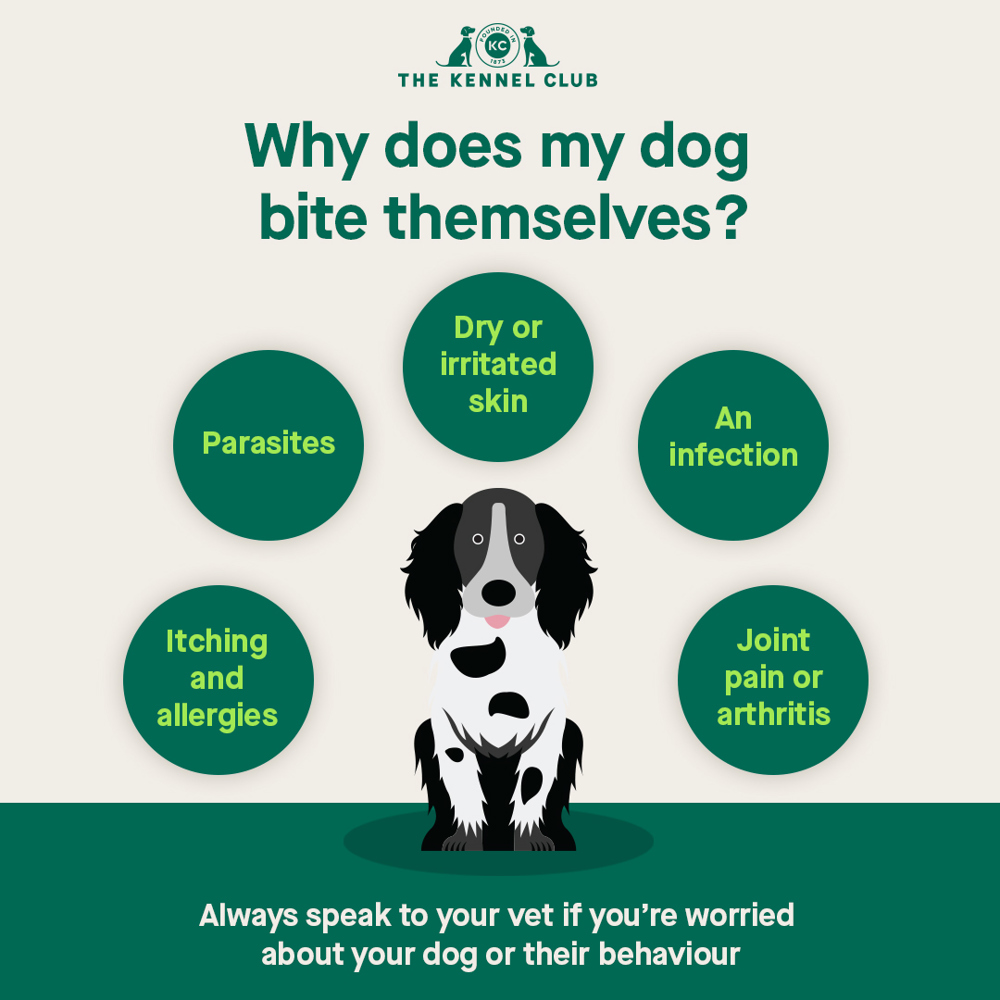
Dogs are known for their playful and affectionate nature, but sometimes, pet owners may notice their furry friends engaging in a less pleasant behaviour—biting themselves. While the occasional scratch or nibble is normal, excessive biting can be a cause for concern. Understanding why dogs bite themselves is crucial for addressing the root cause and ensuring your pet's well-being.
Itching and allergies
One of the most common reasons dogs bite themselves is itching caused by allergies or skin irritations. Dogs can be allergic to certain foods, environmental factors like pollen or dust mites, or even certain grooming products. Itchy skin can lead to excessive scratching and biting, creating a cycle of discomfort for your pet. Consult your veterinarian to identify the specific allergen causing the reaction. They may recommend a change in diet, prescribe medication, or suggest hypoallergenic grooming products.
Parasites
Fleas, ticks, and other parasites are notorious for causing skin irritations in dogs. The bites from these tiny invaders can be incredibly itchy, prompting your dog to bite and scratch in an attempt to alleviate the discomfort. Regularly check your dog for signs of parasites, especially if they spend time outdoors. Use preventive measures such as flea and tick treatments recommended by your veterinarian.
The best lifetime dog insurance
Protect your dog with the UK's Number 1 pet insurer, with up to £25,000 cover for vet fees.
Dry or irritated skin
Just like humans, dogs can suffer from dry or irritated skin, especially in harsh weather conditions. Dry skin can be uncomfortable, leading your dog to bite or scratch in an attempt to relieve the itchiness. Provide your dog with a balanced diet rich in essential fatty acids. Consider using dog-friendly moisturizers or shampoos recommended by your veterinarian to soothe dry skin.
Infections
Bacterial or fungal infections can cause discomfort and itching in dogs, leading to self-biting as they try to alleviate the irritation. Consult your veterinarian for a proper diagnosis and treatment plan. Antibiotics or antifungal medications may be prescribed to address the underlying infection.
Joint pain or arthritis
In some cases, dogs may bite themselves due to joint pain or arthritis. This behaviour may be an attempt to alleviate discomfort in specific areas of their body.
Consult your veterinarian to rule out any underlying health issues. They may recommend joint supplements, pain medications, or other appropriate interventions.
Understanding why your dog bites itself is essential for providing appropriate care and addressing the root cause. Regular veterinary check-ups, a balanced diet, proper grooming, and a comfortable living environment are key factors in preventing and managing self-biting behaviours in dogs. If you observe persistent or severe biting, consult your veterinarian promptly to ensure the health and well-being of your furry companion.
Find a vet near you
If you're looking for a vet practice near you, why not visit the Royal College of Veterinary Surgeons' Find a vet page.
Find a dog trainer or behaviourist
Our online register helps you find accredited dog training instructors and canine behaviourists who have proven specialist knowledge, skills and experience.Think your dog may be affected?
If you're worried about your dog's health, always contact your vet immediately!
We are not a veterinary organisation and so we can't give veterinary advice, but if you're worried about any of the issues raised in this article, please contact your local vet practice for further information

